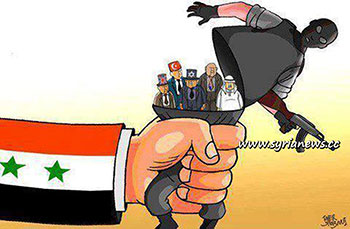One of terrorism’s most feared weapons, the shoulder-fired anti-aircraft missile, has begun to flow into Syria in numbers that alarm the West because they may fall into the hands of al Qaeda, according to national security analysts.
According to the Washington Times, One source puts the count at dozens and growing, saying the missile systems are in the arsenals of Islamist terrorists as well as the U.S.-backed so-called Free Syrian Army.
“It’s at least dozens,” said Matt Schroeder, who tracks the illicit small-arms trade at the Federation of American Scientists. “From what I can tell, it’s in the hands of a wide array of actors, from Free Syrian Army to those with more ideological leanings. Whether al Qaeda-affiliated groups per se have acquired them, I don’t know. It is something we are looking into now.”
Mr. Schroeder said his analysis is based on videos and photos of “systems leaving launch tubes and hitting targets. They have them.”
Next to chemical, biological and nuclear weapons, the missiles — known as MANPADS (man-portable air defense systems) — are the most troublesome for counterterrorism officials because of the worst-case scenario: Terrorists could position themselves within a few miles of civilian airports and shoot down airliners, which have long been prime targets for al Qaeda.
Weighing only 30 pounds, these heat-seeking missile systems can be transported and hidden easily, and have a range of about 2 miles.
The fall of Moammar Gadhafi two years ago opened Libya’s vast stockpiles to an array of militias — some moderate, some tied to extreme Islamic movements. The Pentagon estimated the arsenal at about 20,000 mostly Soviet-designed anti-aircraft missiles, most of them early models of the 30-pound SA-7. With them were a smaller number of the launching systems, with firing tubes and grip stocks.
The al-Qaeda-affiliated terrorists in Syria appear to be operating newer models, along with some heat-seeking SA-7s, indicating that Libya’s looted arsenals are not the only black market sources
Putting shoulder-fired surface-to-air missiles in the hands of terrorists in Syria is a recipe for future terrorist attacks against non-Syrian commercial airliners, according to Larry Johnson, a former US State Department counterterrorism official. “Rather than aggressively pre-empt such deliveries, the United States, at best, has adopted the equivalent of a ‘don’t ask, don’t tell’ policy.” Added Johnson.
According to a US military source, Saudi Arabia already has sent anti-tank missiles, and has been giving the terrorists in Syria updated and sophisticated missiles.
The Lebanese authorities in April 2012 seized an arms shipment originating from the Libyan city of Misrata and carried by the freighter Letfallah II. Among the weapons were SA-7s, 10 SA-7 missiles, six batteries and one grip stock, as well as two more advanced SA-24s, destined for terrorists in Syria.
M.A.

